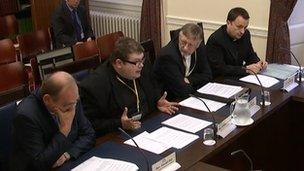Welfare reform creating 'absolute fear' in NI, churches tell MLAs
- Published

Representatives from the four main churches gave evidence to a committee of MLAs at Stormont
Proposed welfare reforms have created an "absolute fear" among the most vulnerable in society, church groups have told MLAs at Stormont.
Representatives from the four main churches in Northern Ireland appeared before the Social Development Committee to discuss the Welfare Reform Bill.
The planned changes include sanctions for those turning down jobs and a cap on benefits paid to a single family.
The coalition government has argued that the changes will "make work pay".
It has insisted the changes will ensure people who are working are better off than the unemployed.
'Lifeboat of welfare'
If the new legislation is passed by MLAs at Stormont, the Welfare Reform Bill would bring the changes brought about at Westminster into effect in Northern Ireland.
On Monday, MLAs heard evidence from local representatives from the Methodist Church, Presbyterian Church, the Catholic Church and the Church of Ireland.
Fr Tim Bartlett said some of the fear stemmed from people "not knowing what is intended".
"I would appeal to you as politicians, even though a lot of this is going to be very difficult news for people, please start telling people as quickly as possible what they need to plan for and what they need to expect," he said.
Fr Bartlett added that he believed child poverty deserved the most urgent attention.
"Nobody wants the lifeboat of welfare to become a lifestyle, but in Northern Ireland, that boat has over 120,000 children and the water is already lapping over the sides," he told the committee.
He also said he was concerned that people were being encouraged to rent out spare rooms in their homes to others they did not know and he urged politicians to ensure strong safeguards were put in place.
Rev Adrian Dorrian said there was a "sense of hopelessness" among young people and they were becoming more reliant on benefits due to the difficulty of finding employment.
"Many think 'what's the point of working hard and trying to get vocational training or qualifications, because at the end there is not going to be anything'," he said.
A spokesperson for the Department for Social Development said: "Detailed information, external on the main welfare reform proposals is available to the public on the government website.
"The site includes a dedicated welfare reform area which outlines the main proposals contained within the Welfare Reform Bill.
"The department is also engaged in extensive stakeholder activity to ensure that the community is well informed on the proposals contained within the bill.
"To date numerous information sessions have been held with community, voluntary, advice and church organisations right across Northern Ireland.
"If the proposals become law for Northern Ireland, the department will ensure that all those affected are informed, and supported through, any change that will affect them."
Job losses
Later on Monday, the committee also took evidence from the trade unions.
Alison Millar of the Northern Ireland Public Service Alliance (NIPSA) claimed there was a potential for up to 1,600 job losses in the public sector if the bill were to be enacted.
These losses would come in the department's dealing with the distribution of benefits, she said.
Ms Millar also said the bill would result in "£500m being removed from the Northern Ireland economy".
Maria Morgan of the Irish Congress of Trades Unions (ICTU) said her organisation was opposed to the bill.
She said it was predicated on "very, very serious cuts of £18bn".
Ms Morgan said Northern Ireland would be the hardest hit region after London when it came to sanctions.
She asked how the sanctions regime could be justified when "there aren't the jobs and there isn't the childcare?"
'Horrific'
Derek Thompson of the Public and Commercial Service Union (PCS) described the bill as a "systematic attack on a class, and on families".
He described the assessment process for the new Personal Independence Payment as "absolutely horrific".
However, the coalition government at Westminster has repeatedly argued that the legislation is necessary to tackle the UK's deficit.
The second stage of Welfare Reform Bill passed through Stormont on 10 October, with a majority of 60 votes to 42 in favour.
- Published10 October 2012
- Published9 October 2012